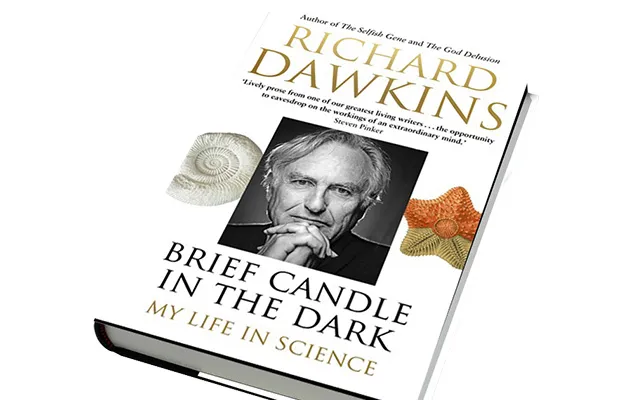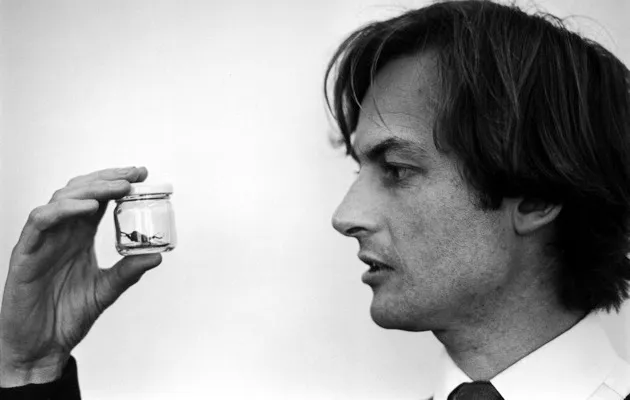Which of your 12 books are you most proud of?
Well,The Extended Phenotypeis the only book I’ve written for a professional audience, so I am very proud of that. But if we’re talking about books for a general audience, I think I’m most proud ofClimbing Mount Improbable, which – funnily enough – is the book that’s sold the least amount of copies.
What’s Mount Improbable?
The metaphor of Mount Improbable is that you have a mountain with a sheer cliff face, and on the top of the mountain is the thing that’s got to be evolved – the complicated adaptation, which might be an eye or something of that sort. It’s impossible to leap from the bottom of the cliff to the top – that would be equivalent to all the parts of the eye coming together in one fell swoop. But if you go round the back of the mountain there’s a gradual slope – it’s easy to walk up the slope step by step, gradually increasing the perfection of the eye. Almost all of the arguments againstevolutionare from people who think it’s about jumping from the bottom of the cliff to the top. But evolution walks slowly, one step at a time. And if you look around the animal kingdom, you do indeed find eyes at all stages.
What do you think has been your most influential idea?
I think that would be the extended phenotype, which is explained at length in the book of that name. A phenotype is the effect the genes have on the body in which they sit – it’s the physical manifestation of the genes. The genes that sit in the body of a bear or a wombat or a kangaroo survive by virtue of making the body in which they sit survive – genes don’t survive naked. So everything about a bear or a wombat or a kangaroo is part of its phenotype.
So if a phenotype is the effect the genes have on the body they’re in to improve its chances of survival, what’s an extended phenotype?
This is the idea that the phenotypes by which genes survive don’t have to be in the body in which the genes sit. A simple example would be an artefact like a bird’s nest. The nest is made by the bird’s behaviour – it’s a complicated construction, exactly the right shape and you could easily see that natural selection will have shaped the nest to be better at keeping the chicks safe. The fact that the nest isn’t part of the bird’s body is what makes it an extended phenotype – you can say exactly the same thing about beaver dams.
You can then say: well, what about parasites? There are numerous beautiful examples of parasites that manipulate the body and behaviour of the host in which they sit. That’s phenotype too.
For example, the so-called ‘brainworm’parasiteinfects an ant in its early life, before moving on to a sheep or other grazing animals. Normally, in the heat of the day, the ant would go down into the ground. But the parasite fluke makes a lesion in the ant’s brain that makes it climb to the top of grass stems, meaning that the ant [and the fluke] is more likely to be eaten by a grazing animal. The behaviour of the ant is the extended phenotype of the genes in the fluke: natural selection is working on the fluke’s genes to influence the phenotype of the ant.

What made you decide to writeThe God Delusion,a book about people’s belief in religions?
I’d always had an interest in the philosophical implications of science and the idea of creation had always seemed to me to be incompatible with evolution. So I’d always had it in mind to bring together my thoughts on religion in a book. I proposed this to my literary agent John Brockman in the late 1990s and he more or less vetoed the idea because he said he couldn’t sell it in America. I think it was probably George W Bush’s presidency that changed his mind!
Did you expectThe God Delusionto cause as much of a fuss as it did?
Oh, of course, yes. I don’t like deliberately stirring up controversy but there was no doubt that it would be controversial. People are going to hit back when their most cherished assumptions are challenged.
What argument docreationists usemost often against the idea of evolution?
It’s usually the idea that evolution is about chance or random luck. But the complexity, beauty and elegance of living things is so complicated and statistically improbable that it couldn’t possibly come about by chance. This misunderstanding forgets that evolution is a cumulative process, where each step just builds in a minute, incremental way on the previous steps.

What is the best evidence for evolution through natural selection?
I think the best evidence is comparative molecular biology. In Charles Darwin’s time this wasn’t available but he made very powerful use of comparative anatomy, comparing the bones of, for example, the arm in lots of different mammals.
Today, the molecular equivalent is even more impressive because of the sheer quantity of data available. By comparing the genomes of different species, you can create an exact ‘tree of cousin-ship’ by literally counting the number of letters [of DNA] that they have in common. The molecular evidence is overwhelming in the case of chimpanzees – if you compare our DNA with theirs letter by letter, the chimpanzee-human resemblance is over 99 per cent.
Why do you think so many people continue to reject evolution?
I think it’s because of a number of things. One of them is human vanity – not wishing us to be ‘mere’ animals. Then there’s the misunderstanding of randomness and also the inability to comprehend the vastness of time that’s involved. [People that reject evolution might say:] “Well, when I see a monkey turning into a human…”. But they’re never going to see that, of course, because it takes much, much too long. People are used to the idea that a rabbit is a rabbit is a rabbit.
But I think the biggest reason of all is religion – many people are taught that evolution is false, and at an early, impressionable age. So they don’t take kindly to anything they see that threatens [that belief].
What is the most important question that evolution has yet to answer?
A very good candidate is the origin of life. Once you’ve got proper genes and something like DNA in place, which is a very high-fidelity replicator, then everything is explained – we understand the whole of life.
But we still need to understand how that first step was taken – [how we got to] the first self-replicating molecule. There are lots of theories and the truth probably lies somewhere around the ones we’ve already got but we may never reach a point that’s any better than being able to say: “That theory’s so elegant it’s got to be true.”

What do you think are the chances of life existing on other planets?
Current estimates suggest there are 1022stars in the Universe and we now know that many, many stars have planets orbiting them, so I think the argument [for life existing elsewhere] is statistically overwhelming. But if there are, let’s suppose, only a billion other life forms in the Universe, they’re likely to be spaced out over such vast distances that we’re unlikely ever to encounter any of them, at least bodily.
If there is life elsewhere in the Universe, do you think it will obey the same laws of evolution?
I would bet my shirt on any life on other planets being Darwinian life. Certainly nobody has ever suggested any alternative to natural selection as a way of getting the illusion of design. But it might be a very different kind of natural selection – it needn’t be DNA necessarily.
If the world in which these hypothetical life forms are found is anything like ours, evolution could give rise to similar end results. We’ve already got a certain amount of indirect evidence for that – we’ve seen independent evolution of, for example, mammals in Australia, Eurasia and South America. And we’ve seen the same features cropping up again and again ever since the dinosaurs went extinct. So it wouldn’t be that surprising to find, say, eyes or legs or wings on the organisms inhabiting another planet. There aren’t that many solutions to the problems vision and movement pose.
Do you find Twitter is a good way to reach your fans?
I can’t make up my mind. I’m kind of aware that I’ve got a very large number of followers – more than a million – so using Twitter does seem to be one possible way of getting a message out. But it’s abundantly clear that the message is often misunderstood, and I think there’s a bit of deliberate misunderstanding. So it’s a double-edged sword.
There’s a video of you on YouTube reading some of your ‘hate emails’…
Oh yes – there are two actually. One with me by the fireside with a cat and one by a fish tank (see below - containsverystrong language). They have generated an enormous amount of enthusiasm, I must say! A lot of people are very amused by them.
Does the hate mail you receive affect you at all?
Certainly not the ones that come from religious nuts – they don’t worry me at all. I get a bit more upset by those that come from people who I think of as natural allies – people on the political left who misrepresent what I say as being bigoted or Islamophobic or that kind of thing.
And do you get fan mail too?
Yes – the ones that please me most are the ones from people that say, “you changed my life,” of which I get a lot actually. Many people say they went to university to become a biologist as a result of reading The Selfish Gene, and that’s immensely gratifying to me – I love that. And a lot of people say they were ‘converted’ by The God Delusion, or that they were already unbelievers but the book helped them to articulate it. I’m dead chuffed.
Follow Science Focus onTwitter,Facebook, Instagramand Flipboard
